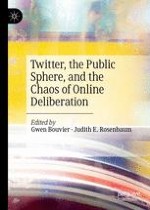2020 | OriginalPaper | Buchkapitel
4. #PeoplesVoteMarch or #LosersVoteMarch? Tracing the Collective Identity of a Post-Brexit Referendum Movement on Twitter
verfasst von : Photini Vrikki
Erschienen in: Twitter, the Public Sphere, and the Chaos of Online Deliberation
Verlag: Springer International Publishing
Aktivieren Sie unsere intelligente Suche, um passende Fachinhalte oder Patente zu finden.
Wählen Sie Textabschnitte aus um mit Künstlicher Intelligenz passenden Patente zu finden. powered by
Markieren Sie Textabschnitte, um KI-gestützt weitere passende Inhalte zu finden. powered by
